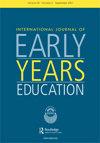Kindergarten students’ and pre-service teachers’ perceptions regarding the frequency of the Moon’s appearance at night
IF 1.3
Q2 EDUCATION & EDUCATIONAL RESEARCH
International Journal of Early Years Education
Pub Date : 2023-11-05
DOI:10.1080/09669760.2023.2278468
引用次数: 0
Abstract
ABSTRACTThe present research investigates the perceptions of kindergarten students, and pre-service teachers from the Early Childhood Education Department at the University of Athens, concerning the frequency of the Moon's appearance in the night sky. Τhe sample consisted of 15 people from each population group. Semi-structured interviews were conducted to collect the data. Data analysis suggests that the vast majority of both population groups consider the presence of the Moon in the celestial dome to be indicative of the night. Furthermore, when the relevant questions are asked independent of the need to explain other phenomena, the participants usually respond with the tautological statement that they can always see the Moon at night because it is night. The research also revealed that although knowledge which is acquired over time from: (a) observational data (e.g. the periodicity of the Moon’s Apparent Motion is not 24 h), and (b) school/extracurricular activities (e.g. the Moon orbits the Earth with a frequency that is not 24 h) constitutes grounds for doubting the belief that the Moon is always visible in the night sky, it does not actually affect this belief.KEYWORDS: Astronomy educationlunar phenomenastudents’ perceptionspre-service teachers’ perceptionsMoon in the night sky Disclosure statementNo potential conflict of interest was reported by the author(s).Ethics statementThe authors report that the study met the ethics/ human subject requirements of the National and Kapodistrian University’s Department of Early Childhood Education (https://www.ecd.uoa.gr/deontologia-erevnas/ – in Greek).Parents’ or guardian’s verbal informed concern has been obtained for all under-aged participants of the study, as required by NKUA’s code of ethics for educational research/ research with under-aged subjects. (http://www.ehr.ecd.uoa.gr – in Greek).幼儿园学生与职前教师对夜间月亮出现频率的认知
摘要本研究调查了雅典大学幼儿教育系的幼儿园学生和职前教师对月亮在夜空中出现频率的感知。Τhe样本由每个人群中的15人组成。采用半结构化访谈收集数据。数据分析表明,这两个群体中的绝大多数人都认为月亮在天穹中的存在是夜晚的象征。此外,当相关问题被问及与解释其他现象的需要无关时,参与者通常会重复地说,他们总是能在晚上看到月亮,因为它是晚上。研究还显示,虽然随着时间的推移,从以下方面获得的知识:(a)观测数据(例如月球的视运动周期不是24小时)和(b)学校/课外活动(例如月球绕地球公转的频率不是24小时)构成了怀疑月球在夜空中总是可见的信念的理由,但它实际上并不影响这种信念。关键词:天文教育月球现象学生感知在职教师感知夜空中的月亮披露声明作者未报告潜在的利益冲突。伦理声明作者报告说,该研究符合国家和卡波迪斯特里安大学早期儿童教育系(https://www.ecd.uoa.gr/deontologia-erevnas/ -希腊文)的伦理/人类受试者要求。根据NKUA关于未成年受试者的教育研究/研究的道德准则的要求,已经获得了所有未成年研究参与者的父母或监护人的口头知情关注。(http://www.ehr.ecd.uoa.gr -希腊语)。
本文章由计算机程序翻译,如有差异,请以英文原文为准。
求助全文
约1分钟内获得全文
求助全文
来源期刊

International Journal of Early Years Education
EDUCATION & EDUCATIONAL RESEARCH-
CiteScore
2.30
自引率
5.30%
发文量
50
 求助内容:
求助内容: 应助结果提醒方式:
应助结果提醒方式:


